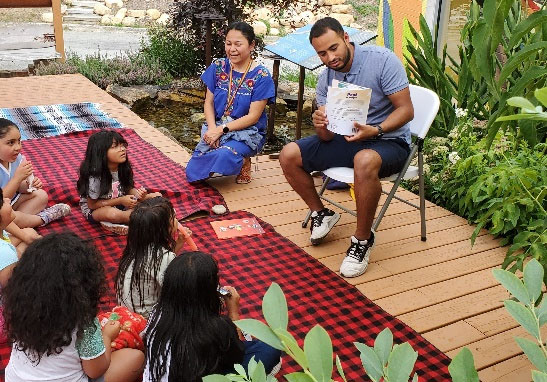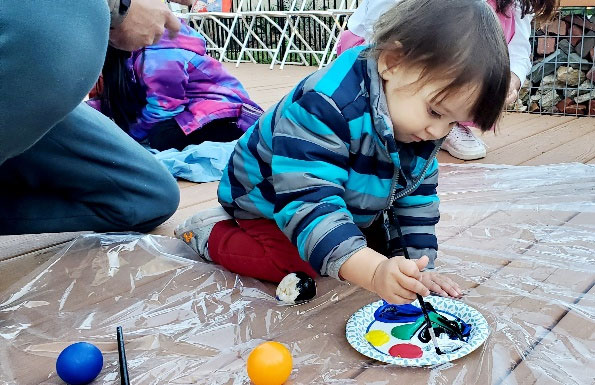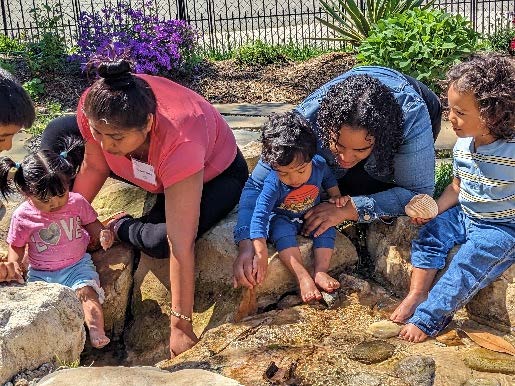 Last year (FY23) we increased community-driven programming in our beautiful therapeutic garden and green space. Regular events held with community partners included the Niñitos de la Naturaleza (“Little Nature Kids”) outdoor learning series with the Museum of Life and Science and Cuentos (“Stories”) family engagement and literacy series with partners including Durham Public Library and Book Harvest.
Last year (FY23) we increased community-driven programming in our beautiful therapeutic garden and green space. Regular events held with community partners included the Niñitos de la Naturaleza (“Little Nature Kids”) outdoor learning series with the Museum of Life and Science and Cuentos (“Stories”) family engagement and literacy series with partners including Durham Public Library and Book Harvest.
Mary Jones, El Futuro’s Manager of Client Care and Engagement, had the opportunity to hear back from a parent after our February Cuentos event. “At the end of the event, a mom approached me to thank me for the event. She shared that she had been struggling with mental health. She found herself unmotivated to do anything, was feeling like life was not worth it any more after a painful divorce, and was struggling financially. She found herself overwhelmed having to work, find childcare, and care for her three young children alone.
 She said that she made an effort to come yesterday because she thought it was important for her and the children to have an opportunity to be outside together, to come to read, and they love to play in the creek! She said: “My children are the ones who make me get up each morning. If it wasn’t for them, who knows where I would be? It has been very hard, but I am still fighting, for them!” I looked at her toddler and asked him: “Quien ama a mamá? Quien ama a mamá?” (“Who loves mama?”) and he smiled and started hugging her, giving her kisses.
She said that she made an effort to come yesterday because she thought it was important for her and the children to have an opportunity to be outside together, to come to read, and they love to play in the creek! She said: “My children are the ones who make me get up each morning. If it wasn’t for them, who knows where I would be? It has been very hard, but I am still fighting, for them!” I looked at her toddler and asked him: “Quien ama a mamá? Quien ama a mamá?” (“Who loves mama?”) and he smiled and started hugging her, giving her kisses.
I was so grateful that she was able to come and find some comfort, a sense of community for herself and her children. I saw her talking for a while with another mom who also had a young child. I think about how precious those opportunities are to connect with others who may understand your struggle. Those days a parent may consider it a “small win”, when you feel like you did something “good” for your children, such as taking them to a book reading. It is those days when you find an opportunity to share your story, and feel understood, that make “las penas pesen menos” (“the sorrows weigh less”). I find myself thinking about how meaningful these events are, and how they could be the “one thing” that a parent needs so they go to bed that night feeling a little better.”
Note: photos do not represent the family whose story is told.


 Alvely Alcántara, LCSW
Alvely Alcántara, LCSW Rossy C. Garcia, MEd
Rossy C. Garcia, MEd  Katy Sims, MD
Katy Sims, MD  Everardo Aviles, LCSW, LCAS (Eve)
Everardo Aviles, LCSW, LCAS (Eve) As a medical anthropologist and social work researcher, Dr. Gulbas’ research embodies interdisciplinarity through the integration of applied theories of health and human development with qualitative and ethnographic methodologies. Her work seeks to understand how people—children, families, and providers—navigate complex sociocultural landscapes in the pursuit of mental health. Most of her work, to date, focuses attention on developing more robust interpretations of suicide risk. With funding from the National Institutes of Mental Health, this body of research has contributed to advancements in theoretical and empirical knowledge of the broader contexts within which youth suicide risk is situated.
As a medical anthropologist and social work researcher, Dr. Gulbas’ research embodies interdisciplinarity through the integration of applied theories of health and human development with qualitative and ethnographic methodologies. Her work seeks to understand how people—children, families, and providers—navigate complex sociocultural landscapes in the pursuit of mental health. Most of her work, to date, focuses attention on developing more robust interpretations of suicide risk. With funding from the National Institutes of Mental Health, this body of research has contributed to advancements in theoretical and empirical knowledge of the broader contexts within which youth suicide risk is situated.  R. Gabriela Barajas-Gonzalez is a developmental psychologist and an assistant professor of Population Health at NYU Grossman School of Medicine. Dr. Barajas-Gonzalez is the principal investigator of a study that examines the impact of immigration-related threat and stress on school communities. She earned a PhD in developmental psychology from Columbia University and hold a BA in human biology from Stanford University. Dr. Barajas-Gonzalez is the daughter of Mexican immigrants and a first gen college student.
R. Gabriela Barajas-Gonzalez is a developmental psychologist and an assistant professor of Population Health at NYU Grossman School of Medicine. Dr. Barajas-Gonzalez is the principal investigator of a study that examines the impact of immigration-related threat and stress on school communities. She earned a PhD in developmental psychology from Columbia University and hold a BA in human biology from Stanford University. Dr. Barajas-Gonzalez is the daughter of Mexican immigrants and a first gen college student. Dr. Parra-Cardona is an Associate Professor in the Steve Hicks School of Social Work (SHSSW) at the University of Texas at Austin. At the SHSSW, he serves as Coordinator for Mexico and Latin American initiatives. He also serves as Area Director for Research at the UT Austin Latino Research Institute. Dr. Parra-Cardona’s program of research is focused on the cultural adaptation of evidence-based parenting interventions for low-income Latinx populations in the US and Latin America.
Dr. Parra-Cardona is an Associate Professor in the Steve Hicks School of Social Work (SHSSW) at the University of Texas at Austin. At the SHSSW, he serves as Coordinator for Mexico and Latin American initiatives. He also serves as Area Director for Research at the UT Austin Latino Research Institute. Dr. Parra-Cardona’s program of research is focused on the cultural adaptation of evidence-based parenting interventions for low-income Latinx populations in the US and Latin America. Bianka Reese, PhD, MSPH is a research scientist and program evaluator specializing in adolescent and young adult sexual and reproductive health. Her previous research in the experiences of Latinx LGBTQ+ youth stems from her work as the Research and Evaluation Manager at SHIFT NC (Sexual Initiatives For Teens), where she led largescale evaluations of multilevel, community-based sexual health promotion initiatives and research projects aimed at elevating the voices of diverse youth in North Carolina. Dr. Reese is currently the Senior Research Strategist at Creative Research Solutions, LLC, an award-winning national evaluation, research, and assessment firm.
Bianka Reese, PhD, MSPH is a research scientist and program evaluator specializing in adolescent and young adult sexual and reproductive health. Her previous research in the experiences of Latinx LGBTQ+ youth stems from her work as the Research and Evaluation Manager at SHIFT NC (Sexual Initiatives For Teens), where she led largescale evaluations of multilevel, community-based sexual health promotion initiatives and research projects aimed at elevating the voices of diverse youth in North Carolina. Dr. Reese is currently the Senior Research Strategist at Creative Research Solutions, LLC, an award-winning national evaluation, research, and assessment firm. Tania Connaughton-Espino, MPH is an independent researcher focused on adolescent and young adult sexual and reproductive health. Her interest in the experiences of Latinx LGBTQ+ youth stems from her previous work with SHIFT NC (Sexual Initiatives For Teens), where she led the training and evaluation department, conducted capacity-building workshops for youth serving professionals including on the topic of how to be more affirming of LGBTQ youth, and from her extensive experience working with the Latinx population in NC.
Tania Connaughton-Espino, MPH is an independent researcher focused on adolescent and young adult sexual and reproductive health. Her interest in the experiences of Latinx LGBTQ+ youth stems from her previous work with SHIFT NC (Sexual Initiatives For Teens), where she led the training and evaluation department, conducted capacity-building workshops for youth serving professionals including on the topic of how to be more affirming of LGBTQ youth, and from her extensive experience working with the Latinx population in NC. Maru Gonzalez, EdD is an Assistant Professor and Youth Development Specialist in the Department of Agricultural and Human Sciences at North Carolina State University. Her areas of inquiry include youth development with a focus on activism, social justice, and the experiences of LGBTQ+ young people across familial, school, and community contexts.
Maru Gonzalez, EdD is an Assistant Professor and Youth Development Specialist in the Department of Agricultural and Human Sciences at North Carolina State University. Her areas of inquiry include youth development with a focus on activism, social justice, and the experiences of LGBTQ+ young people across familial, school, and community contexts.  Nayeli Y. Chavez-Dueñas, PhD
Nayeli Y. Chavez-Dueñas, PhD Hector Y. Adames, PsyD
Hector Y. Adames, PsyD